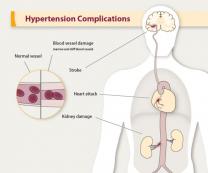Hypertension (High Blood Pressure)

Blood pressure can change through the day and night and also vary based on your mood and activities. When blood pressure is persistently elevated, this can result in the diagnosis of hypertension. Often people have NO symptoms with hypertension and they only way to know is to get your blood pressure checked. When your blood pressure is high (especially for prolonged periods of time), this causes damage to your blood vessels. Over time, this damage can cause serious health problems like stroke, heart disease, kidney disease, and eye problems. Hypertension often runs in families but people can also develop hypertension when no one else in the family has it.
Credit: CDC

Treatment
There are lots of ways to get your blood pressure into a healthy range or help keep it in a healthy range without medicine. These are often called “lifestyle changes.”
- Not smoking
- Maintaining a healthy weight
- Managing stress
- Eating a healthy diet (low in sodium and alcohol)
- Getting at least 150 minutes of physical activity each week
Below you can find more information:
- Diet changes
-
Eating less processed foods (take out, pre-prepared foods, canned foods, lunchmeat) are a good way to start as they are often high in sodium (salt). Loading up on veggies and fruits is helpful. Avoid adding salt to foods and try adding other salt-free spices instead. Moderating alcohol use is key to helping blood pressure. Although alcohol is a “downer,” it has opposite effects on blood pressure. Still not sure how to help your diet? Schedule an appointment with a registered dietician (for free!) at Health Promotion and Wellness (located in the IM building) –call 814-863-0461.
- Get moving
-
All physical activity is good activity! Try to be as active as possible, striving for 150 minutes of physical activity per week (just 30 minutes/day for 5 days). Regular activity (brisk walk or bike riding) can help manage stress, regulate weight and blood sugar, and also help blood pressure. Visit the Campus Recreation homepage to learn how to get moving.
- Stop smoking (or don't start)
-
Smoking (including e-cigs/JUUL) can raise blood pressure and increase your risk of heart attack and stroke. If you smoke but want to cut down or quit, make an appointment with a medical provider at UHS. Or check out the smoking cessation resources offered for free by Health Promotion and Wellness –call 814-863-0461.
Want to dive deeper?
Visit the CDC's webpage on blood pressure for information on hypertension and helpful tips on prevention.
Emergencies
In an emergency, go to Mount Nittany Medical Center or call 911 for an ambulance.
Test Results and Advice Nurse
Send a secure message to the advice nurse via myUHS or call 814-865-4UHS (4847) (Press 3).
Appointments
Schedule an appointment online or by calling the UHS.
Reviewed 01/2023.


